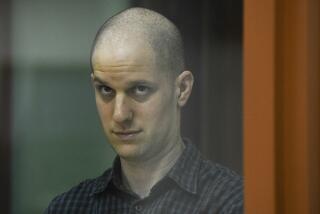Digital Books Case in Jury’s Hands
- Share via
A federal jury in San Jose began deliberating the fate of a Russian software company Thursday in a case that may guide the future of criminal penalties under a 1998 copyright protection law.
Elcom Ltd., better known as ElcomSoft Co., is fighting five charges that it violated the Digital Millennium Copyright Act by briefly distributing computer programs that unlock Adobe Systems Inc.’s encrypted electronic books.
The case is the first criminal trial under the DMCA, though individuals charged under the act have made plea agreements in Sacramento and Nebraska. ElcomSoft programmer Dmitry Sklyarov was arrested at a convention last summer, but the charges against him were dropped in exchange for an agreement to testify in the case.
The DMCA prohibits sales of goods aimed at disabling copyright protection mechanisms, such as those in Adobe’s e-book software. Sklyarov’s arrest and the ensuing trial prompted fierce criticism from computer engineers and civil liberties groups, who say that such enforcement will hurt free speech and technical innovation.
In closing arguments Thursday, lawyers for both sides told jurors in U.S. District Court in San Jose that there was little debate over whether ElcomSoft distributed the programs for a few days in June before Adobe complained. An Adobe employee testified that no illegitimate copies have been found that were made with the ElcomSoft product.
Instead, lawyers asked the jury to try to divine what was in the minds of Sklyarov and the brothers who founded the company, Alex and Vladimir Katalov. That’s crucial because the prosecution must show that ElcomSoft acted “willfully,” which District Judge Ronald Whyte defined as knowing that they were going to break the law.
Assistant U.S. Atty. Scott Frewing stressed that ElcomSoft touted the ability of its $79 and $99 Advanced eBook Processor programs to render e-books free from all restrictions, and he pointed to Vladimir Katalov’s testimony that he was familiar with the DMCA, which was enacted in response to entertainment industry fears about Internet piracy.
“They wanted to sell as much software as they could,” Frewing said, warning that the jury wouldn’t want to live in a world without effective copyrights.
But ElcomSoft defense attorney Joseph Burton said it defied common sense that such an established company would intentionally break the law. He noted that ElcomSoft sells electronic forensic tools, such as those for recovering passwords, to the Internal Revenue Service, the Department of Justice and Fortune 500 companies.
Burton said that ElcomSoft sold the e-book programs on its Web site and advertised it in letters to law enforcement and other customers in the sincere belief that it would be helpful in making backup copies of e-books and transferring them from one machine to another. Those two activities are generally considered fair use, but the DMCA makes no exception for products intended to promote fair use.
The executives may well have been wrong about the law, but they acted in good faith and conducted their sales openly, Burton said. “I would submit to you that criminal conduct is not carried on out in the open.”
If convicted on all counts, ElcomSoft could face fines of as much as $2.5 million. The jury will resume deliberations today.




